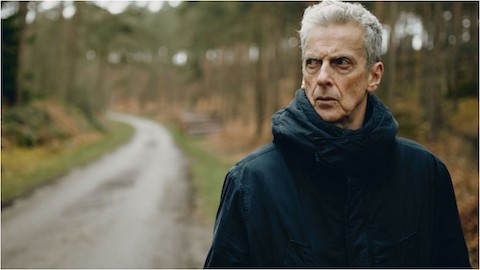Peter Capaldi and Jessica Raine on the Shifting Relationship at the Center of The Devil’s Hour Season 2

The Devil’s Hour is a series that defies easy explanation. Its first season blended a supernatural horror story with a serial killer mystery, all wrapped up in a high-concept multiverse frame. Its competing timelines, alternate realities, and plentiful secrets often kept its characters at arm’s length from both the audience and one another, and the series offered few answers until the season’s final installment rolled around. Thankfully, The Devil’s Hour Season 2 is a more straightforward affair and, as a result, can wrestle much more openly with the moral and philosophical questions at its center.
An ambitious tale of love, sacrifice, and unintended consequences, The Devil’s Hour follows the intertwined lives of Lucy Chambers, a single mother who wakes each night experiencing visions of a life that’s not her own, and Gideon Shepherd, a murderer with the unique ability to “remember” the future, thanks to the fact that he’s essentially been living out a time loop of his own life for many, many years. Now that Lucy has “woken up” to the truth of her previous loops—including the existence of a son who doesn’t belong in any reality—the show manages to streamline its narrative even as it introduces even more complicated twists about the nature of Isaac’s powers, and what kind of life Lucy wants to live, and Gideon’s impact on those around him,
“What’s compelling for me is—well, first of all, this [whole show] is an imaginative leap, right? And in a way that makes it kind of hard to play,” Peter Capaldi, who plays time-bending serial killer Gideon, tells Paste. “I always think genre things are harder to play than people realize because the mechanics of the story always have elements that are not real. So you have to believe in these things. The actors have to believe in these things that are not real and convince everyone else that they are real.”
Capaldi has a more difficult job on this front than most, given that his Gideon is not only the philosophical center around which The Devil’s Hour turns but the mechanism by which its rules and internal narrative logic are explained to its audience. He’s not always particularly likable and his motives can often seem inscrutable, but Capaldi exudes a rather Shakespearean air of inevitable tragedy whenever he’s onscreen.
In Season 2, his character is allowed to become something more than a vaguely ominous threat lurking in the margins of Lucy’s story. Given a tragic origin the explains his obsession with fixing the (many) wrongs of time, this season’s Gideon contains multitudes, from regret and kindness to exhaustion and reage. His relationship with Lucy becomes similarly complicated, as he seeks out her help to thwart a deadly bombing at a toy shop.
The attack kills a dozen people—mostly children—and looms over the bulk of the season. The great unsolved mystery of Lucy’s previous loops, she could not crack the case in all the previous lives in which she was a detective. The pair reluctantly join forces in an attempt to stop the bombing, or at least to identify the culprit so that Gideon can track them down during his next life loop. (This is something of a pattern for him, apparently, and he has a history of killing himself repeatedly until he finds the solution to a problem.)
“In Season 1, I think she saw Gideon totally as the enemy,” Jessica Raine, who plays Lucy, says. “But in Season 2, this new responsibility has sort of been thrust upon her. Once you’ve been woken up, there’s no going back. And she’s a good person—she wants to attain this goal, to stop this horrific crime. But day to day? They just piss each other off. Now there’s this snippiness, this tetchiness, that’s really fun to play and very interesting to explore between them.”
According to Capaldi, Gideon’s ideas about Lucy are a bit kinder, despite his generally darker way of viewing the world.
“I think Gideon’s always had a certain respect for Lucy,” he says. “Although he’s a slightly mad and very weird character with a skewed kind of understanding of morality, I think he does recognize goodness. I think that’s probably what he sees very clearly in her.”
Given that Gideon and Lucy spent most of the series’ first season glowering at one another across a dimly lit police interrogation desk, trusting one another enough to work together is a pretty big evolution in their relationship. But their changed circumstances add some much-needed depth and complexity to their interactions.
“What is fun is that because of the nature of the second season, he can now finally get annoyed at her,” Capaldi says. “Before in Season 1, he was just pulling back layers and revealing this whole spooky cosmic multiple-life thing. This time, they’re actually engaged in a case, as it were. They have a task they have to complete. And so he—he still respects her, but he also gets peeved at her. They’re developing, I think, a deeper, more strange, and stronger kind of relationship, which we’ll see more of later.”
-

-

-

-

-

-

-

-

-

-

-

-

-

-

-

-

-

-

-

-

-

-

-

-

-

-

-

-

-

-

-

-

-

-

-

-

-

-

-

-








































